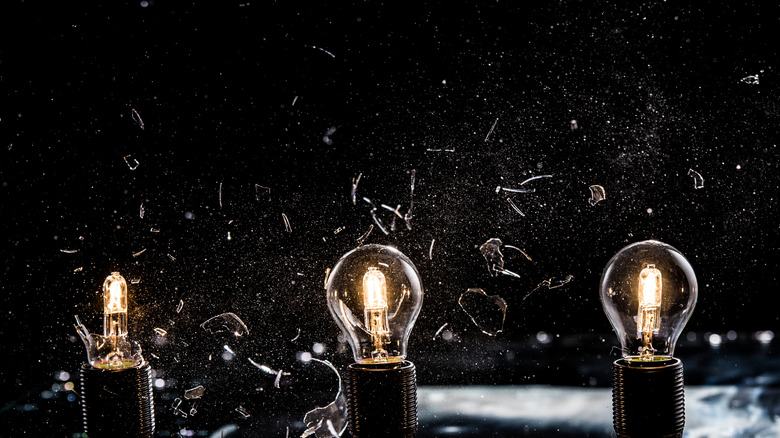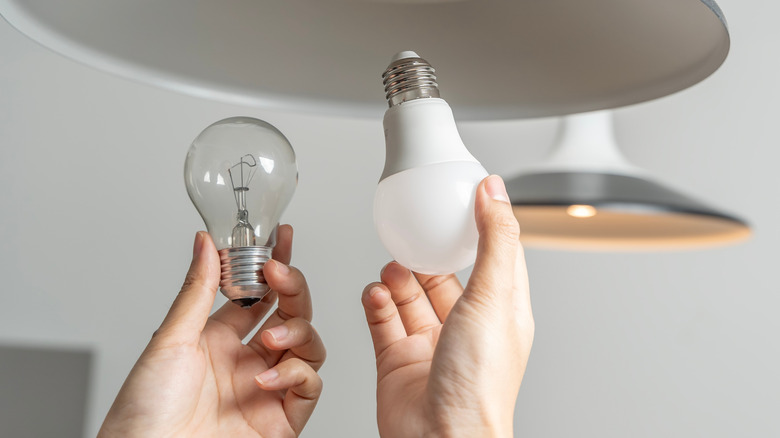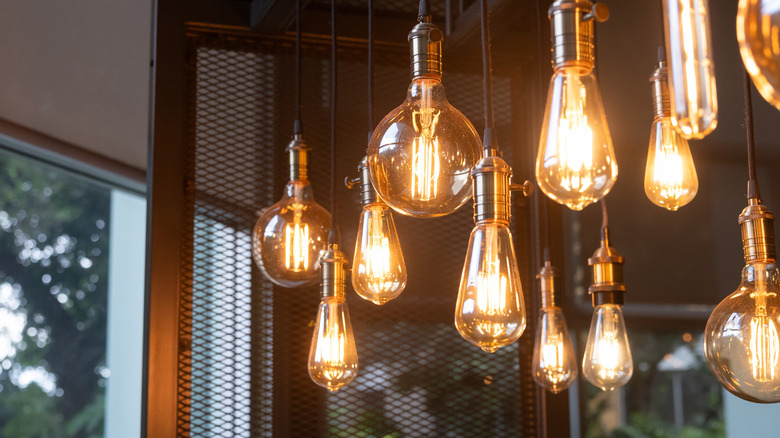Why Do Light Bulbs Pop Or Explode, And Can It Happen To LEDs?
Having a light bulb explode in your home can be quite startling. You're just sitting on your couch, watching TV, and all of a sudden, you hear a loud boom and find that you'll be needing to clean up a bunch of glass that has fallen into your carpet. There are many different reasons as to why you might have a light bulb explode, from manufacturing errors to freak occurrences to just pure user error. On the manufacturing side of things, the only reason why a light bulb would explode would be a design with poor insulation. Without this insulation, there is a pressure imbalance within the bulb. Once the elements in the bulb have degraded enough because of this, it will explode. It is user error that causes more explosions.
Sometimes it's as simple as putting a light bulb in a socket that is too high a wattage. This will cause the bulb to overheat and explode. Sometimes it's because you didn't tighten the bulb into the socket tightly enough, allowing for a loose, unstable flow of power to the bulb that causes overheating. One of the most common has to do with how oily your hands are when installing the light bulb, as residue can help trap even more heat within the bulb, leading to an explosion. The unit being in a spot that vibrates a lot can damage the bulb, which will ultimately explode. A bulb can also explode simply because of a surprise power surge.
Importantly, this is far more likely to happen with incandescent or halogen light bulbs. Nowadays, LED bulbs are all the rage. These should minimize explosions, but they are still possible.
How an LED light bulb can explode
There are a lot of benefits to switching over to LED light bulbs compared to incandescent, halogen, or fluorescent ones. They last longer, they don't use as much power, and they can be a lot brighter. That doesn't even begin to cover all the benefits. One of them is that they are significantly less likely to explode than the other light bulbs, too. The reason for this is that LED bulbs do not emit nearly as much heat as the more traditional types of bulbs. Whatever the physical cause of a bulb explosion is, the overarching explanation always comes down to it overheating.
Just because an LED light bulb is cooler does not mean that it isn't emitting any heat whatsoever. It would just require a lot more power for it to reach the point of explosion. In theory, any of the ways that an incandescent bulb can explode could also be applied to an LED bulb. It is just less likely to occur. This is thanks to the fact that LEDs have a far more direct and streamlined way of handling voltage than an incandescent bulb, which can receive that voltage from all directions at once. So, if you want the best chance of not having to deal with an exploding light bulb in your home, switch over to LED bulbs.
How to avoid exploding light bulbs
Even though the United States banned incandescent light bulbs in 2023 and most everyone has switched to LEDs, taking precautions when installing your new light bulbs to minimize your chance of having one explode is important and, thankfully, quite simple. First and foremost, know exactly what wattage light bulbs you need. If you bought a 100W bulb, don't put it in a socket meant for a 50W one. Light sockets will have a label on them that says what the maximum wattage they allow, and you pick a bulb that doesn't exceed that number. That doesn't mean pick something significantly lower than the maximum, though, as that can cause its own issues.
Then there is the installation process. If you have not done so, thoroughly wash your hands before installing a new light bulb. This way, you can remove as much debris as you can. An even better solution would be to use a pair of latex or nitrile gloves to handle the bulbs. Once you're installing the bulb, make sure you get it as tight as you possibly can before walking away from it. Implementing these simple things into changing out your light bulbs could be key in making sure you aren't cleaning up unwanted glass shards a later date.
Of course, there are some things that are just unavoidable. There's nothing you can do about a poorly insulated bulb except replace it. You may just live in a home prone to extreme power surges. You can minimize the chance of an exploding light bulb, but you can't fully eliminate that possibility.


